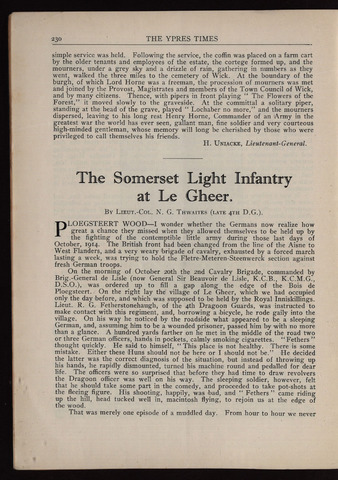230
THE YPRES TIMES
simple service was held. Following the service, the coffin was placed on a farm cart
by the older tenants and employees of the estate, the cortege formed up, and the
mourners, under a grey sky and a drizzle of rain, gathering in numbers as they
went, walked the three miles to the cemetery of Wick. At the boundary of the
burgh, of which Lord Home was a freeman, the procession of mourners was met
and joined by the Provost, Magistrates and members of the Town Council of Wick,
and by many citizens. Thence, with pipers in front playing The Flowers of the
Forest," it moved slowly to the graveside. At the committal a solitary piper,
standing at the head of the grave, played Lochaber no more," and the mourners
dispersed, leaving to his long rest Henry Home, Commander of an Army in the
greatest war the world has ever seen, gallant man, fine soldier and very courteous
high-minded gentleman, whose memory will long be cherished by those who were
privileged to call themselves his friends.
H. Uniacke, Lieutenant-General.
By Lieut.-Col. N. G. Thwaites (late 4th D.G.).
PLOEGSTEERT WOODI wonder whether the Germans now realize how
great a chance they missed when they allowed themselves to be held up by
the fighting of the contemptible little army during those last days of
October, 1914. The British front had been changed from the line of the Aisne to
West Flanders, and a very weary brigade of cavalry, exhausted by a forced march
lasting a week, was trying to hold the Fletre-Meteren-Steenwerck section against
fresh German troops.
On the morning of October 20th the 2nd Cavalry Brigade, commanded by
Brig.-General de Lisle (now General Sir Beauvoir de Lisle, K.C.B., K.C.M.G.,
D.S.O.), was ordered up to fill a gap along the edge of the Bois de
Ploegsteert. On the right lay the village of Le Gheer, which we had occupied
only the day before, and which was supposed to be held by the Royal Inniskillings.
Lieut. R. G. Fetherstonehaugh, of the 4th Dragoon Guards, was instructed to
make contact with this regiment, and, borrowing a bicycle, he rode gaily into the
village. On his way he noticed by the roadside what appeared to be a sleeping
German, and, assuming him to be a wounded prisoner, passed him by with no more
than a glance. A hundred yards farther on he met in the middle of the road two
or three German officers, hands in pockets, calmly smoking cigarettes. "Fethers
thought quickly. He said to himself, "This place is not healthy. There is some
mistake. Either these Huns should not ibe here or I should not be." He decided
the latter was the correct diagnosis of the situation, but instead of throwing up
his hands, he rapidly dismounted, turned his machine round and pedalled for dear
life. The officers were so surprised that before they had time to draw revolvers
the Dragoon officer was well on his way. The sleeping soldier, however, felt
that he should take some part in the comedy, and proceeded to take pot-shots at
the fleeing figure. His shooting, happily, was bad, and Fethers came riding
up the hill, head tucked well in, macintosh flying, to rejoin us at the edge of
the wood.
That was merely one episode of a muddled day. From hour to hour we never

